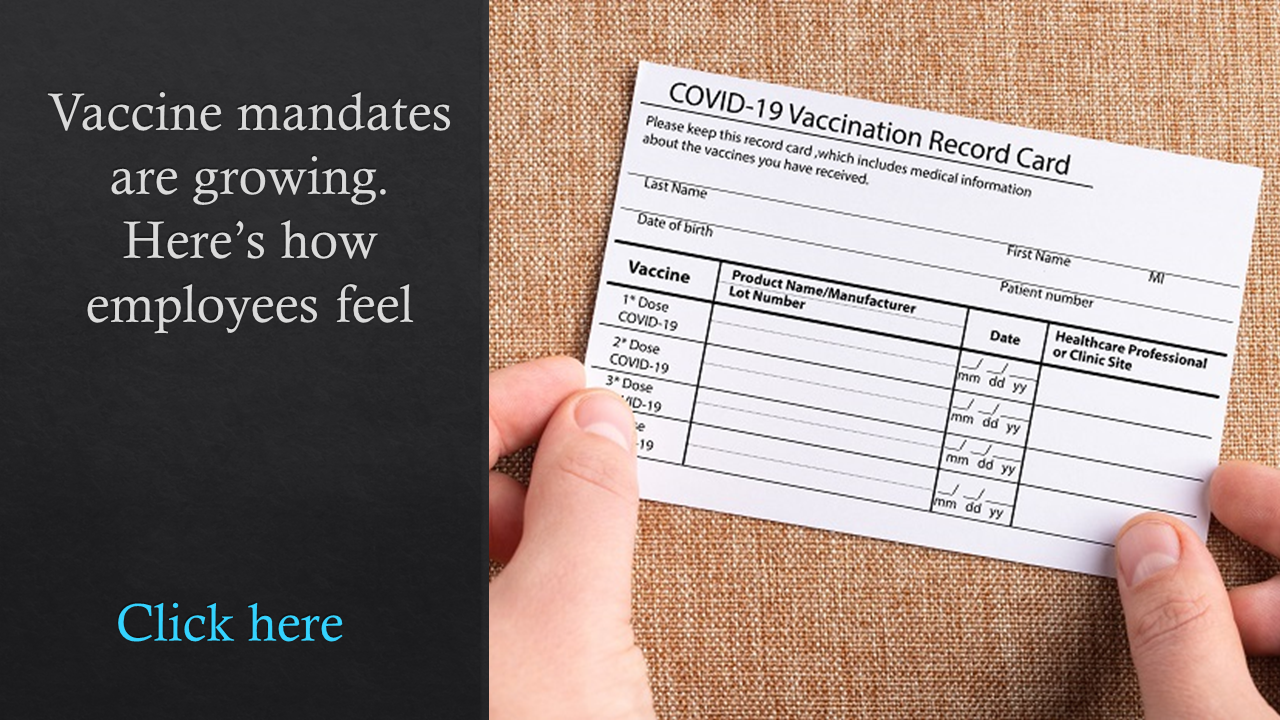Growing more desperate to boost vaccination rates among their employees, employers are moving away from carrots and toward sticks.
More employers are considering hitting unvaccinated employees with healthcare coverage surcharges as the Delta variant wreaks havoc nationwide, consultants tell HRE. Delta Airlines became one of the first well-known companies to announce it would penalize unvaccinated employees. Beginning Nov. 1, unvaccinated employees of the airline who are enrolled in its account-based healthcare plan will pay a $200 monthly surcharge.

“It’s a conversation that’s on a lot of clients’ minds,” says Wade Symons, a partner at Mercer, who says he’s fielded calls from a number of employers over the last several weeks who want to discuss the possibility. “They’re feeling more comfortable with it because there is some momentum. They’re seeing other companies that are doing it or thinking about it and feel like it’s something they can pursue.”
The interest comes as the Delta variant rages throughout the country, driving sharp increases in infections, hospitalizations and death rates. In the process, the COVID surge is disrupting employer plans for returning to the office, safety and more, leaving both companies and employees frustrated over lackluster vaccination rates and the pandemic getting worse instead of better.
“If raising premiums proves an effective tool for encouraging healthy behavior–getting more workers vaccinated–we very well could see more employers use this strategy,” says Melissa Jezior, president and chief executive officer of Eagle Hill Consulting. “Employers and employees are anxious to get back to normal, and higher vaccination rates seem like the only viable approach.”
The rationale behind a premium hike for unvaccinated employees is simple: COVID-19 infections would likely result in higher claims costs, especially for an unvaccinated individual who statistically would have far worse outcomes from infection without inoculation. Those higher claims costs can impact the employer’s bottom line and mean higher future contributions for other employees.
There also is precedent behind it–employers often charge tobacco users higher premiums, for instance.
 When the vaccines were first made available earlier this year, the vast majority of employers aimed to encourage employees to get inoculated with such incentives as financial perks, paid time off and raffles. But a confluence of events–the Delta variant, waning vaccination rates, the FDA approval of the Pfizer shot and President Biden’s call on employers to step up on vaccine mandates–is causing employers to get more aggressive. Employer vaccine mandates have grown in recent weeks, with companies including Google, Tyson Foods and United Airlines announcing they will require some or all of their workers to roll up their sleeves.
When the vaccines were first made available earlier this year, the vast majority of employers aimed to encourage employees to get inoculated with such incentives as financial perks, paid time off and raffles. But a confluence of events–the Delta variant, waning vaccination rates, the FDA approval of the Pfizer shot and President Biden’s call on employers to step up on vaccine mandates–is causing employers to get more aggressive. Employer vaccine mandates have grown in recent weeks, with companies including Google, Tyson Foods and United Airlines announcing they will require some or all of their workers to roll up their sleeves.
“[Employers are realizing], not only should we do this from a public health perspective, but also for employers that have to have employees at the worksite, they need to demonstrate to the rest of the workforce that they’re committed to maintaining a safe and healthy place to work,” Symons says.
Related: These employers are requiring COVID-19 vaccines
Surcharges for the non-vaccinated are another option for employers who are trying to drive up vaccination rates but who may still be leery about mandating inoculation.
“One reason the surcharge is attractive is it still provides the appearance of choice to employees,” Symons says. “It’s more than an incentive, but it’s not going as far as saying, ‘You no longer have a choice in the matter.’”
A high-enough penalty–doubling or tripling the employees’ health premium contribution–likely will cause some workers to rethink their non-vaccination status. “If you’re only increasing it 20, 30 or 40 dollars a month, that might not be enough to change behavior,” Symons says.
Surcharges could be a ‘tricky strategy’
Some employees are also getting behind the idea of hikes for their unvaccinated peers: An August survey of 1,100 employees from Eagle Hill Consulting found that a significant share of workers (41%) think unvaccinated employees should pay higher insurance rates. Employees also support other punitive actions for unvaccinated employees. For instance:
- 63% say non-vaccinated employees should not be given special allowances to work from home;
- 51% say non-vaccinated employees should not be allowed to travel for work; and
- 44% say non-vaccinated employees should not be permitted to work in-person with customers.

The growing support from employees for insurance surcharges for the unvaccinated comes because many employees are burnt out on COVID and are hoping employers can help make a difference on vaccination rates by hitting workers in the pocketbook, Jezior says. Employees, too, are more worried about the Delta variant, which is more contagious and dangerous.
“I also think that some employees may see it as a cost fairness issue–employees who are vaccinated don’t want to bear higher insurance premiums to cover the high healthcare costs for the unvaccinated,” she says.
Jezior predicts that if the Delta variant continues to worsen, disrupting work, school and the economy, there will likely be increased support among employees for punitive actions targeted at the unvaccinated.
Related: Vaccine mandates are growing. Here’s how employees feel
However, like many other issues regarding vaccination, charging unvaccinated employees more for healthcare could be a tricky strategy, experts say. “There is no one-size-fits-all for employers,” Jezior says. “Some schools of thought are that premium surcharges don’t always achieve the desired result, which in this case would be more employee vaccines. It also can create higher compliance burdens and administrative costs. There’s a lot to consider.”
There also are some legal gray areas employers need to figure out–like how EEOC accommodations for unvaccinated people might affect the surcharges. Company leaders should talk with their legal counsel to make sure everything is accounted for if they implement surcharges for unvaccinated employees, Symons says.
Employers at large also have another big reason for caution: the hot job market. Symons says the biggest reason employers are hesitant to hike healthcare costs for unvaccinated workers–or mandate vaccines–is because they’re worried about losing workers to other job opportunities if they don’t agree with their strategies. Still, many employers are realizing they will alienate vaccinated workers and risk them leaving if they don’t act more aggressively.
“You have to move that needle to get vaccination levels higher. A lot of your employees don’t want to work knowing they’re around unvaccinated people,” Symons says. “It doesn’t make them feel safe and secure.”

